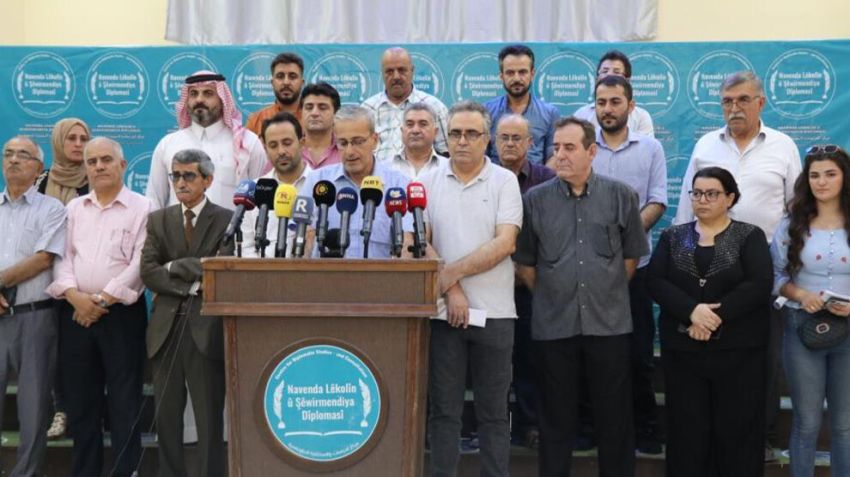
Turkish President Recep Tayyip Erdoğan’s government is publicly signaling that it seeks a rapprochement with Syrian President Bashar al-Assad’s regime after years of being on opposing sides in the Syrian civil war.
However, the left-wing People’s Democratic Party (HDP) — the third-largest party in the Turkish parliament — has warned that Erdoğan is not after negotiations for a peaceful settlement, but rather a deal with Assad to eliminate the Kurdish liberated Autonomous Administration of North and East Syria (AANES — popularly called Rojava).
HDP spokesperson Ebru Günay told an August 25 media conference in Amed/Diyarbakir: “For the first time since 2011, the government, which has continuously supported and even fuelled the [civil] war in Syria, is talking about talks and dialogue with Assad.
“As a party, we are of course in favour of solving all problems through dialogue and negotiation. However, we are also aware that the government’s goal is not really negotiation and dialogue.”
Millions of people have paid a heavy price for the Erdoğan regime meddling in the Syrian civil war, Günay said.
“The [Turkish government] is looking for ways to carry out the operation to liquidate the Kurds, which it first tried to do unsuccessfully through ISIS [Islamic State] and then by invading Syrian territory, this time by partnering with the Assad regime under the name of dialogue and negotiations or by handing them over to Assad.”
“Turkey has no perspective for a solution in Syria,” Günay said. “Its only goal is to fight the Kurds and leave them without status.”
If the Turkish government could get the Assad regime to agree to a plan to leave the Kurds without status, it would easily be prepared to abandon the various militia groups it supports in Syria, she said.
“Another goal [of Erdoğan] is to set up a buffer zone in agreement with the Syrian regime and to settle refugees there. However much Turkey talks about peace, its main policy is to destabilise Syria and Rojava and prepare the ground for invasion and new attacks.”
As next year’s general elections approach, Erdoğan’s partner in government, the ultranationalist and far-right Nationalist Movement Party, has stepped up its scapegoating of Syrian refugees in Turkey for the country’s spiralling economic crisis.
The Turkish government is offering to resettle Syrian refugees in any territory it can seize from the AANES. It is already doing this in Afrin, the westernmost canton of AANES, which Turkey has occupied since 2019. Ethnic cleansing has more than halved the Kurdish population in the area.
Saleh Muslim, a leading figure in the Rojava revolution and co-chair of the Democratic Union Party, told ANF News on August 28: “Turkey is willing to do anything just to annihilate the Kurds. It will also give the Russians or Iran whatever they want. It does everything unthinkable just to defeat the Kurds.
“Not only Russia, but also other international powers and NATO are conducting such a policy towards the Kurds. They tell Turkey, ‘Do this and that with us, and we will remain silent on the Kurds, or we will help you in various ways.’ They take advantage of Turkey’s hostility to the Kurds.
At the July 19 Turkey-Iran-Russia summit in Tehran, disagreement between the three states meant that Turkey was not given the “green light” to “launch the full-scale attack [on Rojava] it wanted”, Muslim said. However, Turkey stepped up its drone attacks after the Tehran meeting.
ANF News reported that Turkish armed drone strikes killed 27 people, including 7 children, in Rojava last month, with further killings in South Kurdistan.
Thirty-three political parties in the AANES issued a joint condemnation on August 22 of any rapprochement between the Erdoğan and Assad regimes.
A peaceful political solution has yet to be found that would bring democracy and freedom to the Syrian people, but such a solution would not come from foreign powers that “bear responsibility for the killings of the Syrians”, the statement said.
Günay shares this perspective: “If Turkey is interested in a solution and peace in Syria, all it must do is withdraw from Syrian territory and abandon its support for the factions associated with it.
“The pursuit of dialogue and negotiations by a government that is responsible for carrying out deadly drone attacks and massacres of civilians on a daily basis, looting and changing the demographic structure can only lead to the exacerbation of these crimes.”